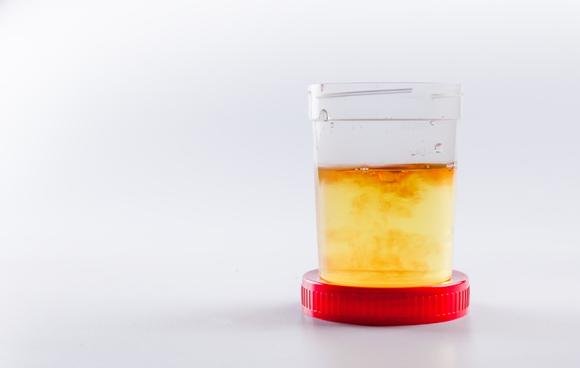Urine can tell a lot about what is going on in our body. It can come in a variety of colors from light yellow to pink or orange.
So the question arises, what do you need to know about the color of urine and what influences it?
Urine - what is it?
A yellowish or brownish fluid that is secreted by the kidneys. The composition of urine usually reflects the water needs of the body.
The main components of urine:
- water,
- urea (urea),
- uric acid,
- table salt (sodium chloride),
- various toxic compounds removed from the body through the kidneys,
- glucose,
- some other compounds.
Why do we pee? - In people, the desire to urinate occurs when 200-250 ml of urine accumulates in the bladder, then its walls begin to contract reflexively.
What color is urine and what does it mean?
The color of your urine can vary depending on what you eat, what medications you take, and how much water you drink. Many of these colors fall within the range of colors that "normal" urine can look like, but there are times when unusual urine colors can cause concern.
Clear urine
Clear urine indicates that you are drinking more than recommended daily water rate.
While hydration is a good thing, drinking too much water can deplete your body of electrolytes. Urine that sometimes appears clear is not a reason to panic, but urine that is always clear may indicate that you need to reduce the amount of water you drink.
Clear urine can also indicate liver diseases such as cirrhosis (a chronic disease in which the damaged liver cells are filled with connective tissue) and viral hepatitis (a disease that damages the liver). If you are not drinking a lot of water and your urine remains clear, you should see your doctor.
Yellow to amber colored urine

The color of "typical" urine falls on the spectrum of light yellow to a deeper amber color. The organic or inorganic substance that has a color that determines the color of your urine is called urochroma pigment, which is naturally present in your urine and is more diluted when you drink water.
Urochrome is produced by your body when it breaks down hemoglobin, the protein that carries oxygen in red blood cells. In most cases, the color of your urine will depend on the dilution of this pigment.
If your blood is high in B vitamins, your urine may also appear neon yellow.
You shouldn't worry about this as it usually happens with supplements. The pigment that gives this bright shade, riboflavin, which is found in almost all multivitamins.
Red or pink urine

Some foods can cause red colored urine. Blood can also make your urine red/pink. The less blood, the better the urine will look.
Food products. Urine may appear red or pink if you eat vegetables or berries with naturally deep pink or purple pigments, such as:
- beets
- rhubarb
- blueberries
Medical conditions. While urine that is red or pink could be from something you recently ate, sometimes there are other reasons. Some medical conditions can cause blood in the urine, a symptom called hematuria, including:
- enlarged prostate
- kidney stones
- tumors in the bladder and kidneys
Medicines. Medicines that can turn urine pink or pink in color include senna or laxatives containing senna, phenazopyridine (Pyridium), and the antibiotic rifampin.
Orange urine

Carrots vitamin C and carotene can cause orange-colored urine, but not always.
Dehydration. If your urine looks orange, it could be a symptom of dehydration.
Medical conditions that can cause your urine to be orange. If your urine is orange, bile may be entering your bloodstream due to problems with your bile ducts or liver. Jaundice in adults can also cause orange urine.
Medicines. Drugs that can cause urine to appear orange may include phenazopyridine (Pyridium), the anti-inflammatory drug sulfasalazine (Azulfidine), and chemotherapy drugs.
Blue or green urine

Food coloring is the most common cause of blue or green urine. In general, blue urine is rare and related to something in your diet.
Food that contains dyes. Blue or green urine can be caused by food dyes, especially a dye called methylene blue. This coloring is found in many candies and some medicines.
Medicines. Drugs that can cause blue or green urine include cimetidine (Tagamet), amitriptyline, indomethacin (Indocin), promethazine (Phenergan), and B vitamin supplements.
Medical procedures. It can also be the result of dyes used in medical examinations of the kidneys or bladder.
Medical conditions. A pseudomonas aeruginosa bacterial infection (lower respiratory tract infection) can also cause urine to turn blue, green, or even purple.
A condition called familial benign hypercalcemia can also cause blue or green urine. This condition can cause low to moderate levels of calcium in the urine and discoloration. Many people with this genetic condition have no symptoms that they notice.
Dark brown (dark) urine

In most cases, dark brown urine indicates dehydration. This results in the release of certain substances that make the urine appear light brown or tea-colored.
Drugs with a brown color. Dark brown urine can also be a side effect of certain medications, including metronidazole (Flagyl) and nitrofurantoin (Furadantin), chloroquine (Aralen), cascara- or senna-based laxatives, and methocarbamol.
Food products. Eating a lot of rhubarb, aloe or fava beans can cause your urine to turn dark brown.
Medical conditions. A condition called porphyria, in which the body over-excretes porphyrins and their precursors, can cause natural chemicals to build up in your blood and cause your urine to look rusty or brown. Dark brown urine can also be a sign of liver disease, as it can be caused by bile getting into the urine.
Vigorous physical activity, especially running, can cause dark brown urine, called exercise hematuria. This is not considered unusual. When your urine is dark due to exercise, it usually clears up after a few hours of rest. If you often see dark brown urine after exercise, or if your urine does not return to normal after 48 hours, you should talk to your doctor about possible causes.
Cloudy urine

You may have noticed that the color does not change, but the urine appears cloudy. This can be caused by an infection such as STI.
Medical conditions that cause cloudy urine. Cloudy urine can be a sign of a urinary tract infection. It can also be a symptom of some chronic diseases and kidney diseases. In some cases, cloudy urine is another sign of dehydration.
If your urine is cloudy and you are pregnant, it could be a sign of a dangerous condition called preeclampsia. You should contact your healthcare professional immediately and let them know if your urine becomes cloudy or bubbly during pregnancy.
Cloudy urine with foam or bubbles is called pneumaturia, during which narrowing of the blood vessels increases blood pressure and disrupts the body's blood flow. It can be a symptom of serious medical conditions, including Crohn's disease (a chronic inflammatory disease of the gastrointestinal tract) or diverticulitis (a digestive problem).
In some cases, the urine is frothy and doctors cannot determine the cause.
When should you seek medical help?
If your urine takes on an unusual color that doesn't seem to be related to the food you eat, medications you take, or dehydration, see your doctor.
Some of the main causes of abnormal or dark colored urine are harmless. Others are serious illnesses that require treatment. Your doctor can help determine the cause of the unusual urine color.
It is especially important to see a doctor if you suspect blood in your urine. You should also make an appointment with your doctor if your urine turns dark brown and your stools are pale in color or you have yellowish skin.
How will the doctor determine the cause?
Your doctor will likely ask you questions about your urine. He will want to know:
- how long was the unusual color
- if you smell unusual odors
- if you have seen blood clots in it
They will likely ask you if you have experienced pain when urinating or other symptoms. They may also ask you about any medications you are currently taking. It is important to report all prescription and over-the-counter medications, as well as any herbal supplements you take.
Depending on the color of the urine and other symptoms, the doctor may prescribe one or more tests. Your doctor will probably take a sample of your urine to be tested in a lab to check for signs of infection or other abnormalities.
He may also take a sample of your blood for testing. Blood tests can help them see if your liver and kidneys are working properly.
The doctor may also perform an ultrasound examination of the bladder or kidneys. This imaging test uses sound waves to create a picture of your internal organs.
Abdominal and pelvic scans may be performed if urinary tract stones are suspected. When indicated, imaging tests can help your doctor check for structural defects in the urinary tract.
Frequently asked questions about urine
Here are answers to the most common questions people ask about urine color:
What is the normal color of urine?
The normal color of urine is pale yellow. This is due to a substance called urobilin, which is a waste product from the breakdown of red blood cells.
What do different urine colors mean?
Urine color can change for various reasons. For example, very dark yellow urine may indicate dehydration, while red or pink urine may indicate bleeding from the urinary system. Other color changes may have other causes, such as taking certain medications or eating certain foods
When should I see a doctor about changes in urine color?
If you notice that your urine is an unusual color and it lasts for more than a few days, or if you notice other symptoms such as pain, fever or difficulty urinating, you should see your doctor.
Can certain foods or medications change the color of urine?
Yes, some foods and medications can change the color of your urine. For example, beets and blueberries can make your urine pink or red, and certain medications can make your urine dark yellow, green, or even blue.
Can dehydration change the color of urine?
Yes, dehydration can make your urine darker. This is because when the body is dehydrated, it tries to retain as much water as possible, making the urine more concentrated and darker.
Why is my urine dark?
Dark urine can be due to a variety of reasons, such as dehydration, the use of certain medications, the consumption of certain foods, or certain medical conditions such as liver disease or infection.
Is dark urine a serious symptom?
Dark urine can be a sign of a serious medical condition, but it can also be a temporary condition caused by dehydration or the consumption of certain foods. If you notice that your urine is constantly dark, you should consult your doctor.
Urine treatment is also important
You can tell a lot by looking at your urine. However, medical professionals can tell much more through the complex analysis that is done during a urinalysis during a regular physical exam.
You don't just pour urine into that cup when you go to the doctor. You're providing information - and it can be one of the best things you can do for your health.











